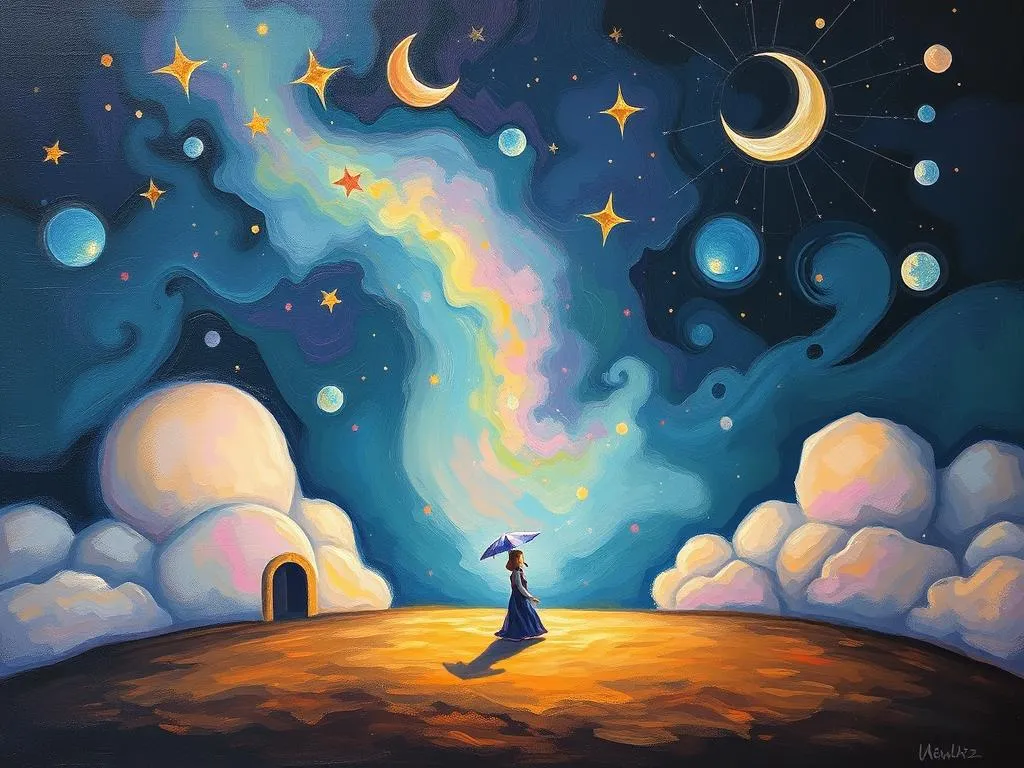
Dreams have long fascinated humanity, serving as a bridge between the conscious and the subconscious. Among the myriad types of dreams, dark dreams—often characterized by feelings of fear, anxiety, or despair—are particularly intriguing. These dreams can evoke strong emotions and sometimes leave lasting impressions upon waking. Understanding dark dreams is essential, as they often reflect our inner thoughts, fears, and unresolved issues. This article delves into the symbolism, variations, and real-life connections associated with dark dreams, encouraging readers to explore their own subconscious landscapes.
Symbolism and Meaning
Dark dreams can be rich in symbolism, often revealing hidden aspects of our psyche. Below are some of the common symbols and their meanings:
- Chasing: Being pursued in a dream can symbolize feelings of anxiety or stress in waking life. It may represent avoidance of certain issues or fears you are not ready to confront.
- Falling: This is a prevalent imagery in dark dreams, often linked to feelings of loss of control or insecurity. Falling may signal a need to reassess aspects of your life that feel unstable.
- Monsters or Threatening Figures: These entities often represent repressed fears or anxiety. They can embody real-life stressors or unresolved trauma that requires acknowledgment.
- Dark Places: Dreaming of being in a dark or unfamiliar environment may indicate feelings of confusion or uncertainty in waking life. It can also symbolize the unknown aspects of yourself that need exploration.
- Water: Bodies of water can be powerful symbols in dark dreams. Calm waters may represent tranquility, while stormy seas can signify emotional turmoil or overwhelming feelings.
Different perspectives can give varied meanings to these symbols. For instance:
- Psychological Perspective: From a psychological point of view, dark dreams may serve as a cathartic release of pent-up emotions, allowing the dreamer to confront their fears indirectly.
- Spiritual Perspective: In some spiritual frameworks, dark dreams may indicate a need for spiritual cleansing or a warning to pay attention to one’s inner self.
- Cultural Perspective: Depending on cultural backgrounds, dark dreams can be seen as omens or messages from the unconscious, urging the dreamer to make life changes or confront certain truths.
Reflecting on these symbols can help individuals gain insights into their emotional states and life circumstances.
Key Scenarios and Variations
The nature of dark dreams can vary greatly, each scenario offering a unique lens through which to interpret the experience. Here are some key scenarios and their potential meanings:
- Being Trapped: Dreams where one feels trapped can symbolize a sense of helplessness or being stuck in a situation. This might indicate a need to break free from toxic relationships or unfulfilling jobs.
- Natural Disasters: Experiencing earthquakes, floods, or other disasters in dreams might reflect feelings of chaos in waking life. Such dreams can signal impending change or the need to prepare for unexpected challenges.
- Death or Loss: Dark dreams involving death can be particularly unsettling. They often symbolize transformation or the end of a particular phase in life. In some cases, they may represent fear of change or loss of control.
- Isolation: Dreams of being alone in a dark place can reflect feelings of loneliness or abandonment. This may be indicative of social anxiety or a desire for connection that feels unfulfilled.
- Nightmares with Family or Loved Ones: When family members appear in dark dreams, they may embody unresolved conflicts or concerns about relationships. This can serve as a prompt for deeper reflection on familial dynamics.
Understanding these variations can help individuals pinpoint specific emotions or situations in their lives that may be contributing to these dark dreams. It is essential to consider the context of the dream and the dreamer’s personal experiences when interpreting these scenarios.
Real-Life Connections and Takeaways
Dark dreams often resonate with real-life experiences and emotions. Here are some insights on how to connect these dreams with your waking life:
-
Self-Reflection: Take time to reflect on the feelings and images presented in your dark dreams. Consider what aspects of your life may be causing stress or anxiety. Journaling can be an effective tool here. Write down your dreams and your feelings about them to uncover patterns and themes.
-
Identify Triggers: Examine your daily life for potential triggers that may induce dark dreams. Stressful situations, unresolved conflicts, or significant life changes can all play a role. By identifying these triggers, you can work towards addressing the underlying issues.
-
Embrace Emotions: Acknowledge the emotions that arise from dark dreams instead of suppressing them. Allowing yourself to feel fear, sadness, or anxiety can be liberating and lead to personal growth.
-
Seek Support: If dark dreams persist and impact your daily life, consider talking to a trusted friend or mental health professional. Sometimes, discussing your dreams can provide clarity and relief.
-
Mindfulness and Relaxation Techniques: Incorporating practices like meditation, yoga, or deep breathing exercises can help calm the mind, potentially reducing the frequency and intensity of dark dreams. Establishing a relaxing bedtime routine can also create a more peaceful sleep environment.
Encouraging personal reflection on dark dreams can lead to profound insights and healing. It can be beneficial to explore what these dreams reveal about your fears, desires, and unresolved issues.
Conclusion
Dark dreams, while often unsettling, serve as valuable windows into our inner worlds. By understanding the symbolism, variations, and connections to our waking lives, we can transform these dreams from sources of fear into opportunities for self-discovery. Reflecting on our dreams allows us to confront our anxieties and embrace the complexities of our emotions. As you continue your journey through your subconscious, remember to approach your dark dreams with curiosity rather than trepidation, and allow them to guide you towards greater self-awareness and understanding.







